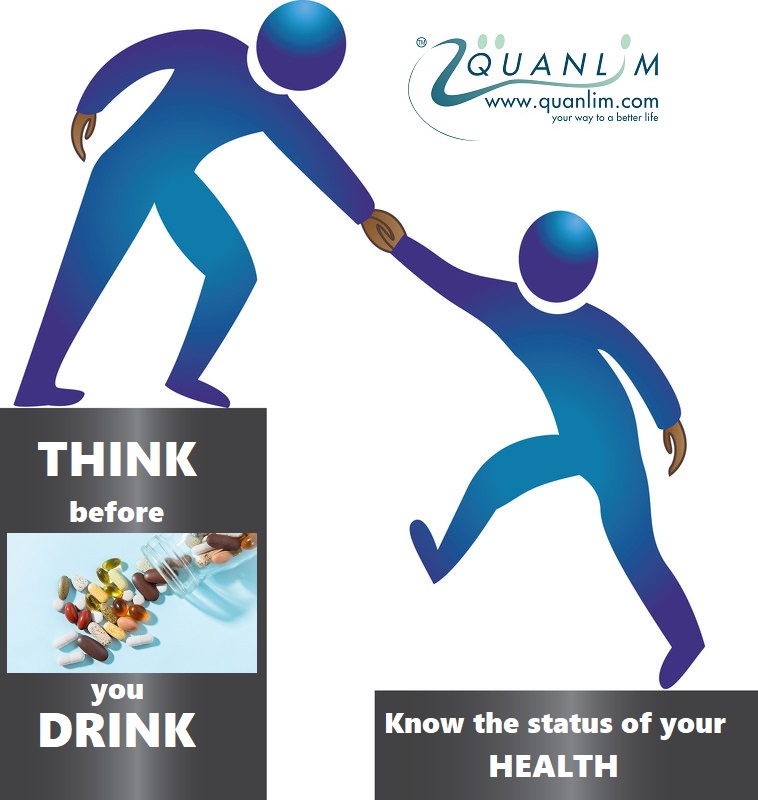Welcome to our weekly Quanlim Life- Health information and news for Farmers and families.

Digestive enzyme supplements are designed to be taken with each meal to complement the body’s own digestive enzymes produced primarily by the pancreas. The pancreas secretes enzymes to breakdown the main food groups entering the body, including: amylases for carbohydrate digestion, lipases for digesting fats and proteases for protein digestion. But this doesn’t always work out as it should.Supplemental digestive enzymes go the extra mile: they contain the above enzymes as well as others that the body does not specifically generate, which aid digestion of specific types of fibres or carbohydrates. One example of this is cellulose: an enzyme which helps us breakdown cellulose – a plant fibre otherwise indigestible to humans.Why do we need a supplement if we make most of the enzymes ourselves? In a state of optimal health and nutrition we do make adequate amounts of digestive enzymes ourselves and obtain others from the fresh raw foods we eat. But throw in stress, chronic disease, poor nutrition and food allergies – to mention just a few of life’s problems – and suddenly the body is not so well equipped.As we age, the level of enzymes we produce declines. Since we rely heavily on enzymes to unlock nutrients from the food we eat, the importance of good digestion with adequate enzymes becomes paramount to maintain good health.
STRESS-
Are you often tired, brain fogged, and struggle with sleep? If feeling tired and wired has become your new normal, I’ve got news for you – it’s NOT! Many times, it’s a sign of adrenal fatigue. Nowadays, stress is part of life. Between financial worries, relationship struggles, work stress, and traffic jams – none of us are immune. But when too much stress goes on for too long, we can run into problems. Extreme or prolonged stress can burn out your adrenal glands, resulting in adrenal fatigue. Wondering if adrenal burnout is to blame for your symptoms? Read on to learn what adrenal fatigue is, what causes it, and how to reverse it naturally.
What are Your Adrenal Glands?
Your adrenal glands are two small triangular-shaped glands that sit on top of your kidneys. They work in concert with the pituitary gland and hypothalamus. Together, this trio makes up the HPA axis, which is in charge of your stress response. Your adrenal glands play many roles. But their main job is to produce hormones – the chief one being cortisol.
What is Adrenal Fatigue?
In short, it’s an imbalance of cortisol. Your stress hormone cortisol is meant to follow a natural rhythm. It rises in the morning to help wake you up and then gradually falls throughout the day. Cortisol and your sleep hormone melatonin have an inverse relationship. When cortisol rises, melatonin dips, and vice versa. This supports a healthy sleep-wake cycle. But if you’re under extreme stress for too long, your adrenal glands may not be able to keep up with cortisol production. Your cortisol rhythm may get out of whack – and be too high or too low at the wrong times. This can disrupt your sleep and make you feel like you’re dragging yourself through the day. And if left untreated, long-term adrenal fatigue can progress into adrenal exhaustion. This is when both cortisol and DHEA are low. In essence, it’s when your adrenals have pooped out. People suffering from adrenal exhaustion are often so tired they can barely function in their day-to-day lives. They may spend most of their time in bed because their bodies simply don’t have the energy for anything else.

Quanlimlife

Stomach acid plays two important roles in your body: breaking down food and killing harmful microbes that you ingest- Acidity levels are measured by the pH scale from 1 to 14, with 1 being the most acidic, 7 being neutral, and 14 being the most alkaline. The pH of stomach acid (hydrochloric acid) is around pH 1, which is as strong as battery acid. Although, gastric juice also contains water and mucus, so normal pH of the stomach is typically between pH 1.5 to pH 3.5, Low stomach acid, also known medically as hypochlorhydria, is when the stomach does not produce enough acid to maintain a strong acidic environment. Complete loss of stomach acid production is called achlorhydria. It is also possible for the stomach to produce too much stomach acid. This is usually caused by the condition called Zollinger-ellison syndrome, where the body produces excess gastrin, the hormone required for stomach acid production. The most common symptoms of low stomach acid are discomfort in the stomach, bloating, belching and a feeling full quickly or feeling full for long periods after eating. Low stomach acid may lead to poorer digestion of proteins because pepsin, the digestive enzyme which breaks down protein, is most active in acid at around pH 2. Having low stomach acid puts you at an increased risk of intestinal infections like bacterial gastroenteritis (food poisoning) and small intestinal bacterial overgrowth (SIBO).

Olive oil is perishable and is better in every sense when it is fresh. Critical beneficial attributes (like polyphenol levels, antioxidants, flavor, and aroma) decline over time, while undesirable things– like rancidity and free radicals– develop. There is a direct correlation between freshness and nutrition, shelf life, and taste.
The International Olive Oil Council (IOOC) has a United Nations charter to develop criteria for olive oil quality and purity. Their main focus is regulating the legal aspects of the olive oil industry and preventing unfair competition. The standards they have developed are recognized by the vast majority of the world's olive oil producers and marketers. The International standards under resolution COI/T.15/NC no 3-25 (revised June 2003) lists nine grades of olive oil under two primary categories. Olive oil and olive pomace oil. This section provides the official definitions from section 2 of the standard for each of the nine grades.
The IOOC standard oils must meet certain criteria for inclusion into specific categories. The olive oils must not be adulterated with any other type of oil, must pass a sensory analysis by a certified panel of tasters, and must meet the analytical criteria. The standard indicates all the tests used to determine genuineness and purity along with legal requirements for the label. Olive oil is defined as oil obtained solely from fruit of the olive tree (Olea Europaea L.) Virgin oils are obtained solely by mechanical means that do not lead to alterations in the oil.

NEEM KENNIS
By ons is jy spesiaal- en wil ons jou gesond sien- Vry van al die kwale en allerhande Sintetiese pille en voorgeskrewe pille wat jou liggaam verniel en jou ontneem van 'n gesonde liggaam. Jy kan gesond word as jy die regte plan en metode volg- Dis in jou om al hierdie kwale te oorkom. Jy het nie nodig om sieklik oud te word nie.

QUANLIM LIFE - LIFEISELECT
We only make use of Suppliers who practise the following
We only purchase raw herbal ingredients from reputable manufacturers.
A signed certificate of analysis must accompany each ingredient.
Even from excellent sources, we occasionally reject a herbal extract because it does not meet our strict requirements.
All our products are manufactured in sterile environments.
We adhere to strict international Good Manufacturing Practices.
Our manufacturing facility is inspected by the Medicines Control Council on a regular basis.
Up to date batch records are kept on all manufactured products.
To ensure safety, shelf life and stability on our dermatological products, stability testing is done on a regular basis.
Message
Regulation 42(4) prohibits any off-label statements. This means, any indication for which a product is not registered for that use by SAHPRA – the medicines regulatory authority. Any person or entity, are offences in terms of section 29 of the Medicines Act, which could attract fines or even imprisonment. What is permitted are disease awareness campaigns, which we as a company fully support, as they benefit public health, if the public and patients are empowered. Disease awareness activities may however not lead to the support, endorsement or recommendation, specifically or by implication, of any specific schedule 2 to 6 medicine. South Africa.



















